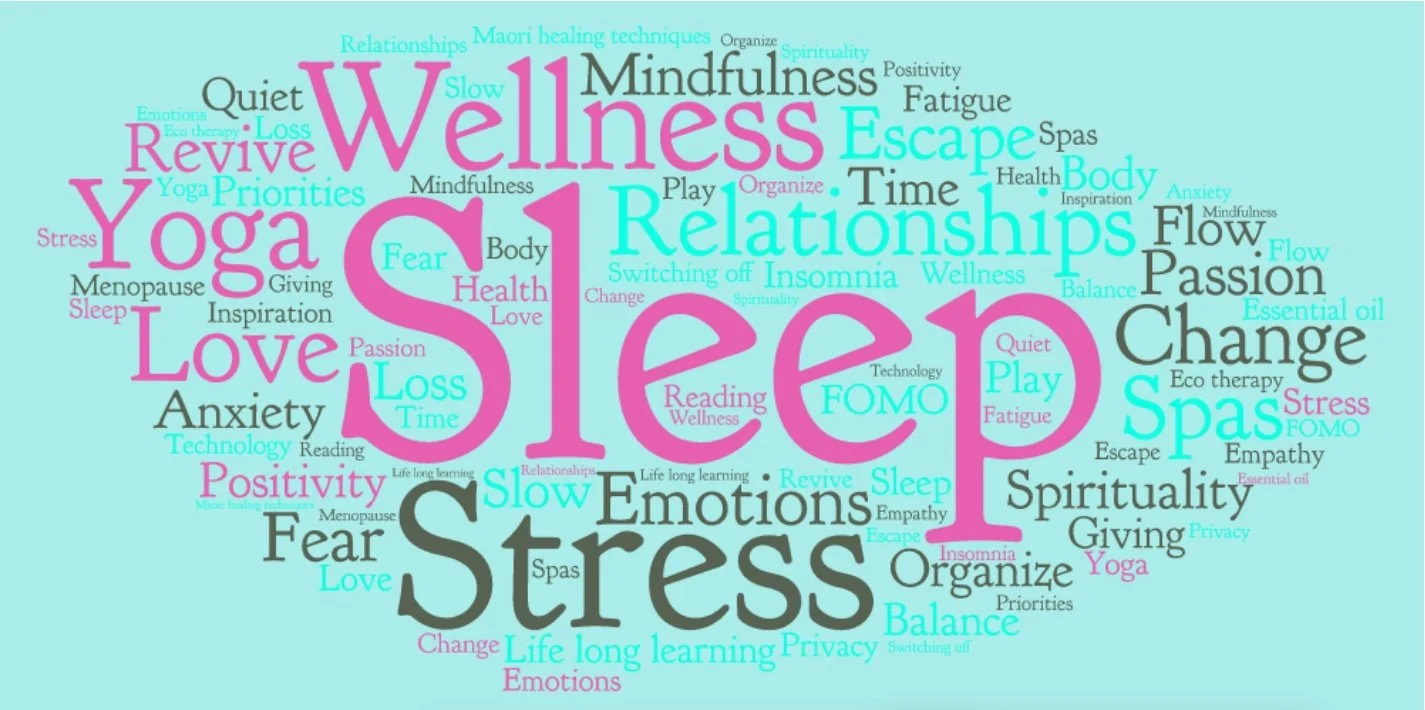In search of sleep
A visualisation of topics mentioned in women’s magazines
After a quick and entirely unscientific survey of a few popular women’s magazines in New Zealand aimed at over 30 year olds, I pulled out keywords from main article titles. The word image represents at a glance what we read, and it would seem, what keeps us awake.
It is no surprise that sleep features so prominently. A Finnish study found that for women, stress related insomnia starts rising in their 30s and doesn’t really decline until after 60. This is due to a number of reasons like the inevitable changes in hormone levels that come as women transition through menopause in their mid to late 40s and early 50s.
Ideally we spend about a third of our lives asleep. We know it’s important, and the magazines emphasised the variety of unpleasant issues that can arise from too little sleep—from feeling alone, anxiety and depression to diabetes and stress. Lack of sleep can also make you less empathetic impacting relationships. It’s a vicious circle.
And the impact of sleep deprivation extends beyond the personal. According to Arianna Huffington, Huffington Post Editor in Chief (we’ll come back to her later) “the total annual cost of sleep deprivation to the US economy is more than $63 billion in absenteeism and “presenteeism” (“when employees are present at work physically but not really mentally focused”).
However, if your lack of sleep is a choice to stay up later to get things done’’, keep in mind the benefits. Along with significant improvements to your health and wellbeing, apparently just one hour of extra sleep for a woman increases the chances of having sex by 14 percent!
Why sleep matters
Knowing you’re not getting enough sleep though is hardly helpful if you’re grappling with insomina. Often the thing that keeps you awake at night is the worry about the fact that once again, it’s 3am, and you’re awake! And herein lies the issue. For many women, the mid-years bring an irritating familiarity with ‘madrugada’ — a Spanish word for the wee hours between midnight and dawn. And if we’re to believe one study, even exercise won’t help. It reports that 12 weeks of yoga or of aerobic exercise did sod all to help women experiencing sleep issues and hot flushes during menopause.
“Although the women had no difficulty falling asleep, disturbed sleep was common at baseline and remained after each intervention, with women in all groups waking during the night for an average of more than 50 minutes.”
Stress and screens
Then there are the ubiquitous screens, which have crept into all of our lives with the stealth worthy of a preying mantis. The blue light emanating from screens affects levels of the sleep-inducing hormone melatonin, and therefore our sleep patterns and our body clock — circadian rhythm.
For many, the lure of the device and work’s increasingly 24/7 expectations mean their relationships with screens are so intimate that the idea of a distinction between work and home life is positively quaint.
As Professor Anne-Marie Slaughter said in the The Atlantic magazine Why Women Still Can’t Have It All:
“The culture of ‘time macho’ — a relentless competition to work harder, stay later, pull more all-nighters and bill the extra hours that the international dateline affords you—remains astonishingly prevalent among professionals today.”
Screens are also having an impact on personal relationships and communication as this study notes:
“Evidence derived from both experiments indicates the mere presence of mobile phones inhibited the development of interpersonal closeness and trust, and reduced the extent to which individuals felt empathy and understanding from their partners.”
In fact many people now spend more time in front of a screen than they do asleep.
Improving sleep habits
Thankfully numerous people have devoted many many hours tackling the issues surrounding sleep. After collapsing from exhaustion, which doctors attributed to sleep deprivation, Arianna Huffington, wrote The Sleep Revolution: Transforming Your Life, One Night at a Time. Echoing Professor Slaughter, Huffington says:
“Our cultural assumption that overwork and burnout are the price we must pay in order to succeedis at the heart of our sleep crisis.”
While the first part of her book looks at why we need to get enough sleep, the second part focuses on ways to get more sleep. Unsurprisingly, her number one tip is removing devices from the bedroom. Huffington also recommends creating sleep rituals such as relaxing teas, meditation and hot baths.
Find out more
For other tips on improving your sleep visit Harvard’s Healthy Sleep site, which also has information about the science of sleep and a useful interactive about the Finding Your Sleep/Wake Rhythm.
'The Sleep Solution' by W. Chris Winter @sportspeople offers a range of solutions to help you sleep.
'Why We Sleep' by Matthew Walker is a thoroughly researched book but it focuses heavily on why it’s so important, which can be anxiety inducing if you haven’t yet managed insomnia.
